|
|
|
Sort Order |
|
|
|
Items / Page
|
|
|
|
|
|
|
| Srl | Item |
| 1 |
ID:
120578


|
|
|
|
|
| Publication |
2013.
|
| Summary/Abstract |
Armen Oganesyan, Editor-in-Chief of International Affairs: This year marks 200 years of the Battle of Borodino in the Patriotic War of 1812. How were you preparing for this anniversary? Which new exhibitions can one see?
A. Shkurko: Our main achievement was the putting together of the Museum of the 1812 Patriotic War. Incidentally, this was also a top priority item in the anniversary projects program approved by the federal government. It will be recalled that our predecessors set up in 1908 a special committee charged with establishing a museum of the 1812 Patriotic War. The idea was approved by Nicholas II and they launched a wide-ranging collection of exhibits, materials and funds for the museum. The subscription lists sent out to the provinces did not fetch much money but they brought back a lot of memorabilia. They came from the museums of military regiments, the descendants of 1812 war veterans and private collectors. The donations added up to nearly 20,000 objects and even a greater number of documents. There was a contest among the architects to design the museum building, but its construction was abandoned for lack of funds. In 1913, the interest in the anniversary petered out; then there came in succession the First World War, Civil War and other calamities.
|
|
|
|
|
|
|
|
|
|
|
|
|
|
|
|
| 2 |
ID:
120577


|
|
|
|
|
| Publication |
2013.
|
| Summary/Abstract |
MEDIAEVAL ALANIA was a state of the Alans, ancestors of the contemporary Ossetians; it disappeared under a series of fierce attacks of the Tatar-Mongolian hordes the waves of which followed one another throughout the 13th and 14th centuries. Long and bloody wars weakened the country and brought it to the brink of a demographic catastrophe. Small groups of survivors retreated high into the mountains in the southeast of the once strong state.
|
|
|
|
|
|
|
|
|
|
|
|
|
|
|
|
| 3 |
ID:
120547
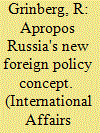

|
|
|
|
|
| Publication |
2013.
|
| Summary/Abstract |
THE FAST CHANGING international situation requires Russia's flexible and timely reaction to the new challenges and threats to its security that arise in the process of the constant evolution of the entire system of modern international relations. At the same time, the Russian Federation, too, is in the process of transformation; it is acquiring new possibilities for an effective response to these challenges and threats; the structure of its national security interests is changing, which should find its reflection in Russia's new foreign policy concept. It is therefore not surprising that among the first decrees V.V. Putin signed after his inauguration as the president of Russia is the decree "On Measures to Ensure the Realization of the Russian Federation's Foreign Policy Course" that instructed the RF Foreign Ministry to present a new draft of the RF foreign policy concept. This will be the country's fourth foreign policy concept since the disintegration of the USSR 21 years ago.
|
|
|
|
|
|
|
|
|
|
|
|
|
|
|
|
| 4 |
ID:
120553


|
|
|
|
|
| Publication |
2013.
|
| Summary/Abstract |
International Affairs: How do you assess the dynamics of Russia-NATO relations today and what is the main prerequisite for the constructive development of these relations?
A. Grushko: There are dynamics, but sadly, the changes in the Euro-Atlantic military-political landscape today are clearly lagging behind the trends of integration, interdependence in all key areas of interstate and economic ties. As far as Russia is concerned, absolutely all vectors of its development are linked to increasing interaction with the outside world and further integration into global economic processes.
|
|
|
|
|
|
|
|
|
|
|
|
|
|
|
|
| 5 |
ID:
120559


|
|
|
|
|
| Publication |
2013.
|
| Summary/Abstract |
International Affairs: Vladimir Mikhailovich, Brazil is of growing interest all over the world, including Russia. What, in your opinion, is the reason for this?
V. Davydov: Brazil has long been ranked high for its potential. Let us recall Stefan Zweig. Having immigrated to Brazil before WWII, Zweig was impressed by the country's abundant resources and he predicted its intensive development. He called his last book "Brazil, Land of the Future."
Events of the past two decades show that Brazil is becoming the country of the future in the present. It has entered into the 21st century with an imposing record having won respect from both its neighbors and its partners in meridians far removed from the New World.
Today, it is in the top ten countries with the greatest economic potential. But it's not only that. In the contemporary era, an essential thing is to have impressive achievements demonstrating the technological power and the innovative capacity of the state and businesses. And I must say that Brazil has stepped into the 21st century not only with a huge gross domestic product of more than $2 trillion; it came with its own nice suitcase of innovation-related achievements.
|
|
|
|
|
|
|
|
|
|
|
|
|
|
|
|
| 6 |
ID:
120557
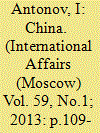

|
|
|
|
|
| Publication |
2013.
|
| Summary/Abstract |
ON NOVEMBER 8-15, 2012, China held the 18th National Congress of the Communist Party of China (CPC) in which a process of generational change in Chinese leadership began.
This time around the preparation and the congress itself occurred in the midst of a rather complex situation. It is impossible not to recall the removal from power (at the year's start) of one of the most popular politicians, the head of the Chongqing municipal Party committee, son of famous revolutionary Bo Yibo - Bo Xilai, who aspired for one of the highest party posts. In addition, a role was played by Western media reports concerning Vice President Xi Jinping and Premier Wen Jiabao's "family riches" that are hard to make without protection from above.
|
|
|
|
|
|
|
|
|
|
|
|
|
|
|
|
| 7 |
ID:
120565
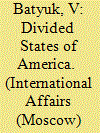

|
|
|
|
|
| Publication |
2013.
|
| Summary/Abstract |
THE 57TH PRESIDENTIAL CAMPAIGN in the United States has become history. Summing up will take time yet preliminary conclusions about the state of American society and future American domestic and foreign policies are possible.
The campaign better described as a clash of political views and ideologies was unprecedentedly harsh; the contenders were unprecedentedly incompatible not because of their personalities but because of the diametrically different views and opinions of the social and political forces behind them. This looked like the final battle between the Republicans who had moved further to the right and who represented lily-white rich Americans and the Democrats supported by a patchwork of minorities of all hues (African Americans, Latinos, LGBT Americans, supporters of abortions and legalization of marijuana, etc.).
|
|
|
|
|
|
|
|
|
|
|
|
|
|
|
|
| 8 |
ID:
120558
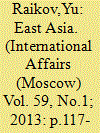

|
|
|
|
|
| Publication |
2013.
|
| Summary/Abstract |
THIS PAST SUMMER, the worsened territorial dispute in East Asia between Japan and China, Japan and the Republic of Korea, China and certain ASEAN members has appreciably soured the situation in the Asia-Pacific region. It reminded us of the fragility of peace in this exceptionally important region and placed this situation, together with the situation in the Middle East, at the top of the world's political agenda. The dispute involves three leading world nations on which peace in the international arena depends to a large extent. Located in the region are nations which are the first, second and third world economies (USA, China and Japan) with an enormous economic potential and great political influence on both the fortunes of the world economy and the situation in international relations on the whole.
|
|
|
|
|
|
|
|
|
|
|
|
|
|
|
|
| 9 |
ID:
120556


|
|
|
|
|
| Publication |
2013.
|
| Summary/Abstract |
THE "SECOND REPUBLIC" in Egypt was born on June 30, 2012; on that day, President-elect Mohamed Morsi administered the oath. He is the first civilian president since the revolution of July 23, 1952: for 60 years, the country was ruled by the military. Four presidents - Muhammad Naguib, Gamal Abdel Nasser, Anwar Sadat, and Hosni Mubarak - were officers and relied on the army. The military assumed power when on February 11, 2011, after eighteen days of popular unrest, they had to remove President Mubarak from his post.
|
|
|
|
|
|
|
|
|
|
|
|
|
|
|
|
| 10 |
ID:
120564


|
|
|
|
|
| Publication |
2013.
|
| Summary/Abstract |
FOR MORE THAN HALF A CENTURY, global hydrocarbon production concentrated around the Middle East. For many years, the traditional oil and gas meridian ran along the axis: Yamal-Turkmenistan-Iran-Iraq-Kuwait-Saudi Arabia. But today we are witnessing a radical change in the situation: the center of world oil production is rapidly shifting to the Western Hemisphere. The new energy axis runs from the Canadian province of Alberta through the American states of North Dakota and Texas, and on through Mexico, Venezuela and Brazil.
|
|
|
|
|
|
|
|
|
|
|
|
|
|
|
|
| 11 |
ID:
120550


|
|
|
|
|
| Publication |
2013.
|
| Summary/Abstract |
Here is a synopsis of the problems signally important for the media and our profession.
Europe, and Russia as its part, is looking for a new identity; we all know that they travel different paths and that their opinions and their philosophies are very different. They are united by the very fact of the quest: indeed, few people in the United States or Latin America are bothered with identification.
|
|
|
|
|
|
|
|
|
|
|
|
|
|
|
|
| 12 |
ID:
120569


|
|
|
|
|
| Publication |
2013.
|
| Summary/Abstract |
IT IS IMPORTANT, in appraising the role of South Africa as today's player on the international political scene and an active participant in global associations of countries, to form a realistic idea of the political image the country projects internationally and the political situation inside the country. The hardest part is to make sense of the political situation inside South Africa, taking into account the evolving phenomenon of ethnic democracy.
|
|
|
|
|
|
|
|
|
|
|
|
|
|
|
|
| 13 |
ID:
120549
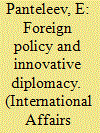

|
|
|
|
|
| Publication |
2013.
|
| Summary/Abstract |
FOR SEVERAL MONTHS NOW, the International Affairs journal has played host to a debate on the new version of the Foreign Policy Concept of the Russian Federation. Views have been expressed by eminent experts on various aspects of its content as well as its strategic principles, and the major foreign policy thrusts of Russia have been closely scrutinized.
|
|
|
|
|
|
|
|
|
|
|
|
|
|
|
|
| 14 |
ID:
120544


|
|
|
|
|
| Publication |
2013.
|
| Summary/Abstract |
Armen Oganesyan, Editor-in-Chief of International Affairs: To sum up the results of the year, we have invited to us Sergey Alexeevich Ryabkov, Deputy Minister of Foreign Affairs of the Russian Federation. 2012 was rich in international events. Which of them would you highlight with a plus sign and which with a minus sign?
S. Ryabkov: I'll start with the minuses, they weren't that many.
Syria is a minus in the sense that the situation has not improved, and Russia's efforts to develop a platform on which to work towards a Syrian-led settlement did not materialize due various reasons.
Another minus that I would put after this one is the lack of adequate progress on a number of aspects of our relationship with the U.S. In some ways, there was a serious backslide. We see what emotions the year's end has struck: the Magnitsky Act and the inevitable retaliatory steps that we are taking have seriously complicated our relations.
There are also downsides which are not as "politically charged," for example the difficulties that we are having in a visa dialogue with the European Union.
I shall name among the positive results the creation of the Eurasian Economic Commission made up of Russia, Belarus and Kazakhstan; strengthening of the Collective Security Treaty Organization; and the development of relations with a number of countries in different regions, including Latin America. Russia's accession to the WTO is a big plus. And then there is the BRICS - certainly not describable as a bureaucratic structure, but it is also not a loosely knit, non-cohesive group. Our work is progressing quite well in this direction. There are other pluses. We look to the future with optimism. Gone are the election cycles in Russia and the U.S., America's new administration is taking shape, and we are entering Obama's new presidential term with certain expectations.
|
|
|
|
|
|
|
|
|
|
|
|
|
|
|
|
| 15 |
ID:
120575
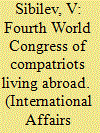

|
|
|
|
|
| Publication |
2013.
|
| Summary/Abstract |
THE FOURTH WORLD CONGRESS of Compatriots Living Abroad, held on October 26-27, 2012 in St. Petersburg at Tauride Palace in accordance with Federal Law of May 24, 1999 "On State Policy of the Russian Federation Regarding Compatriots Living Abroad" by a decision of the government of the Russian Federation and with the support of the Russian Ministry of Foreign Affairs, was a central event in the life of compatriots not only of this year, but also of the entire three-year period between congresses.
|
|
|
|
|
|
|
|
|
|
|
|
|
|
|
|
| 16 |
ID:
120563


|
|
|
|
|
| Publication |
2013.
|
| Summary/Abstract |
EARLY IN THE 21ST CENTURY, global economic growth was in high gear and multilateral while national financial institutions pretty much lagged behind in responding to real sector demands and social challenges. The crisis of 2008-2009 was the natural reaction to the shortcomings in managing global changes; with the U.S. as the epicenter of occurrence, and the subsequent European wave of its spread, the turmoil affected, in some degree or other, all countries of the world. So strong had the interdependence of the different economies proved to be that American and European consumer behavior took its toll on the incomes of people in many countries. The fear of a global depression prompted leaders of the world's major economies to the collective search for solutions in the Group of Twenty negotiations. Within the span of four years, the leaders of the countries forming this group met seven times, and their last summit was held in Mexico. In December 2012, Russia will head up the Group of Twenty, which increases world interest in our country, its conceptual approaches and its G20 priorities for the period ahead. At the same time, there is a growing interest in Russia for information about the Group of Twenty, the prerequisites of its formation and the prospects of its evolution, and about the experience of conducting summits in other countries, especially of the last Mexican presidency; we will attempt to satisfy this interest in our article.
|
|
|
|
|
|
|
|
|
|
|
|
|
|
|
|
| 17 |
ID:
120572


|
|
|
|
|
| Publication |
2013.
|
| Summary/Abstract |
STATES AND TERRITORIES are cautious about exchanging information for tax purposes even though such exchange has long been recognized as a tool for combating international tax evasion.
In the late 1930s, most governments polled on behalf of the League of Nations noted the difficulties they would face in exchanging information and listed the reasons for this. At first glance, these reasons were quite diverse, but on closer inspection it becomes obvious that the problem lay in the difficulty of amending legislation so as to allow governments to demand information from their subjects not for domestic purposes but for meeting the requests of other states
|
|
|
|
|
|
|
|
|
|
|
|
|
|
|
|
| 18 |
ID:
120568


|
|
|
|
|
| Publication |
2013.
|
| Summary/Abstract |
THE PIRATENPARTEI DEUTSCHLAND (Pirate Party of Germany) is a new creative, charismatic and original player in German politics. In a short span of time, the Pirates have succeeded not only to gain a reputation of a real political force but also to enliven the discussion on the essence and paths of extending democracy in the country.
|
|
|
|
|
|
|
|
|
|
|
|
|
|
|
|
| 19 |
ID:
120562
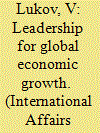

|
|
|
|
|
| Publication |
2013.
|
| Summary/Abstract |
ON DECEMBER 1, 2012, Russia assumed the presidency of the Group of Twenty, one of the most influential informal associations of states on the international scene. Put together, the members of the G20 account for about 90 percent of global GDP and 80 percent of world trade.
|
|
|
|
|
|
|
|
|
|
|
|
|
|
|
|
| 20 |
ID:
120571
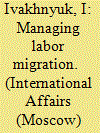

|
|
|
|
|
| Publication |
2013.
|
| Summary/Abstract |
INTERNATIONAL LABOR MIGRATION is the quintessence of the inherent challenges of globalization, embodying the contradiction between the interests of states receiving migrants and those of the states of their origin. The search for compromise international mechanisms to streamline the flows of labor migration and maximize the potential inherent in it lies at the base of the debate on migration, the intensity of which has increased in conditions of the global economic crisis. International organizations insist that the observance of human rights is the only possible approach to the formation of an international system of labor migration management. How realizable in the contemporary world is the idea of human rights as the basis of inter-state cooperation on labor migration and how does it get modified under the influence of the increasing migration interdependence of states?
|
|
|
|
|
|
|
|
|
|
|
|
|
|
|
|
|
|
|
|
|